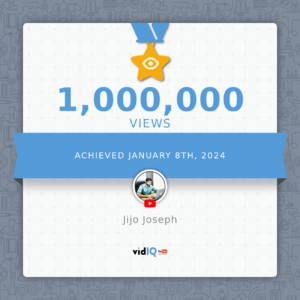SEO COURSES & CLASSES
Free SEO Guide for Beginners in Malayalam

Free SEO Course in Malayalam
Mastering SEO (Search Engine Optimization) can feel like a challenge, but it doesn’t have to be expensive! Jijo Joseph’s YouTube channel offers a treasure of free SEO courses for beginners. Whether you’re searching for “free SEO training” or the “best SEO course for beginners,” Jijo Joseph’s channel provides a free SEO course for beginners that breaks down complex topics into easy-to-understand videos. Learn the secrets to keyword research, website optimization, and building authority – all for free!
Free SEO Guide in Malayalam
Jijo Joseph
No.1 SEO Expert in Kerala & India
Jijo Joseph is a No. 1 Freelance SEO expert Kerala with over 10+ years of experience in the digital Marketing. A Google and HubSpot certified Digital Marketing Consultant in Kochi. Successfully completed more than 200+ global projects. Have conducted over 1000+ SEO audits. Trained more than 12K+ students in the past few years. A regular YouTube Blogger on SEO and Digital Marketing.

What is SEO ?
SEO stands for search engine optimization—the practice of increasing the quantity and quality of traffic to your website through organic search engine results. The ultimate goal of SEO for business is to generate organic traffic—searchers clicking through to your website from a search engine results page (SERP).

How search engine works ?
Search engines use special programs to scan and understand websites. When you search, these programs quickly find and show you the most helpful websites based on what you're looking for. It's like a smart librarian helping you find the right books in a huge library of information.

Organic Search Vs Paid Search
Organic search is free, like earning your spot in search results. Paid search involves paying for a top spot, similar to putting up an ad. One is earned, the other is bought.
Long Tail Vs Short Tail Keywords
Short tail keywords are general, like "shoes," while long tail keywords are specific, like "running shoes for women with arch support." Short tails attract a broad audience, while long tails focus on exact needs—think broad versus specific.


How to do Keyword Research ?
Keyword research is like being a detective for the internet. It's finding the words people type into search engines when looking for something. By figuring out these words, you can make sure your website shows up when people search for things related to what you offer.
Google Keyword Planner
Google Keyword Planner is like a helper tool from Google. It helps you find the best words to use on your website so that more people can find it. You tell it what your website is about, and it suggests words that people often search for—making your website more likely to pop up when they're looking for something like what you have.

What is SEO Difficulty
SEO difficulty is like a measure of how hard or easy it is to get your website to show up on the first page of search results. If a keyword has high difficulty, it means it's tough to compete and rank high. If it's low, it's easier to stand out and get noticed by people searching for things related to your website.


Advanced Keyword Research
Advanced keyword research is a method used to find the best words and phrases that people type into search engines when looking for information. It goes beyond basic keyword research by considering factors like search volume, competition, and user intent.

What is a Meta Title Tag ?
In SEO, a Meta Title Tag is like the headline of a book for your website. It's a short and catchy title that tells search engines and people what your page is about. Think of it as the first thing someone sees about your website in search results, like the title on the cover of a book.
Importance of Meta Description
An SEO meta description is a brief summary, usually around 150-160 characters, that provides a concise overview of the content on a web page. It appears in search engine results below the title and URL

How Create SEO Friendly URL's
An SEO-friendly URL is a web address that is structured in a way that is easily understandable by both search engines and users. It typically includes relevant keywords related to the content of the page and is concise, descriptive, and user-friendly.

The Role of Sitemaps in SEO
In SEO, a sitemap is a guide for search engines, listing all your website's pages. It helps search engines find and understand your content, improving your site's visibility and search result rankings.

The Ultimate Guide to Robots.txt
In SEO, a robots.txt file is like a note to search engines telling them which parts of your website to look at and which to ignore. It helps you control what information search engines can access, ensuring they focus on the important stuff.

"OGP" Everything You Need to Know
In SEO, OGP stands for Open Graph Protocol. It's like a set of instructions for social media platforms, telling them how to display your content when shared. OGP helps ensure that when your website link is shared on social media, it looks good and provides the right information, like a preview of a webpage.

An Overview about Canonical Tags
In SEO, a canonical tag is like a guidepost for search engines, showing them which version of a page is the main one. It's helpful to avoid confusion and make sure search engines know which page to prioritize when there are similar ones. It's like saying, "This is the main page you should pay attention to."

Internal Linking
In SEO, internal linking is like creating pathways within your own website. It means adding links on one page that lead to other pages on the same website. These links help visitors easily move around your site and also show search engines how your pages are connected.


Google Tag Manager
It's like a manager for all the tracking stuff, making it easier to organize and update without needing a developer each time. This helps you track how people interact with your site, which is super useful for understanding your website's performance.
Google Search Console
Google Search Console in SEO is like a dashboard that helps you understand how your website appears in Google search results. It gives you insights into what keywords people use to find your site, which pages are popular, and if there are any issues that might affect how your site shows up in search

On Page SEO
In SEO, on-page SEO is about making your individual web pages as friendly as possible for both people and search engines. It involves tweaking things directly on your website, like using relevant keywords in your content, creating descriptive titles and headings, and organizing your information in a way that's easy to understand

What is Schema Markup
In SEO, schema markup is like a special language that helps search engines understand the content on your website more clearly. It's a set of code or tags that you add to your web pages to provide extra information about things like events, products, reviews, and more

Backup in SEO
Backing up your website is like creating a safety net. It's important because if something goes wrong, like a website crash or data loss, you can restore your site to its previous state. This helps you avoid losing valuable information, time, and effort.

SEO Competitive Analysis
Competitors analysis is important because it's like peeking at what others are doing to get better at your own game. By understanding what your competitors are up to, you can learn from their successes and mistakes. This helps you make smarter decisions, stand out in the crowd, and stay ahead in the competition



